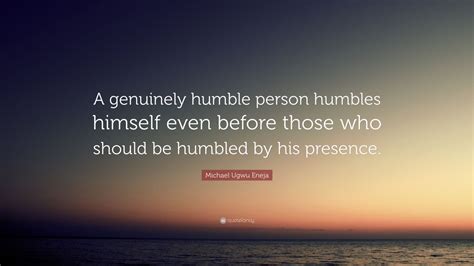A Quote by Michael Ugwu Eneja
Humility is a priceless virtue; however, it takes a lot of self-emptying to cultivate it.
Related Quotes
An essential virtue is humility. ... The principle of humility and prayer leads one to feel a need of divine guidance. Self-reliance is a virtue, but with it should go a consciousness of the need of superior help-a consciousness that as you walk firmly in the pathway of duty, there is a possibility of your making a misstep; and with that consciousness is a prayer, a pleading that God will inspire you to avoid that false step
Humility is just as much the opposite of self-abasement as it is of self-exaltation. To be humble is not to make comparisons. Secure in its reality, the self is neither better nor worse, bigger nor smaller, than anything else in the universe. It is ? is nothing, yet at the same time one with everything. It is in this sense that humility is absolute self-effacement.
The barrier during self-improvement is not so much that we hate learning, rather we hate being taught. To learn entails that the knowledge was achieved on one's own accord-it feels great-but to be taught often leaves a feeling of inferiority. Thus it takes a bit of determination and a lot of humility in order for one to fully develop.
































